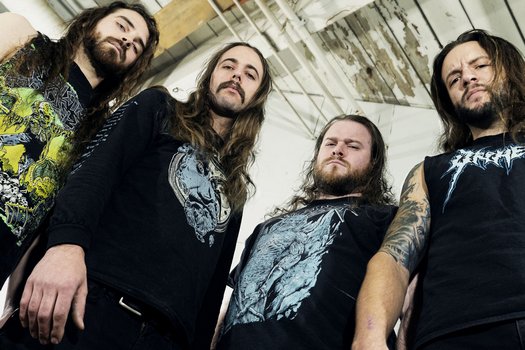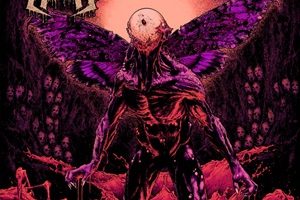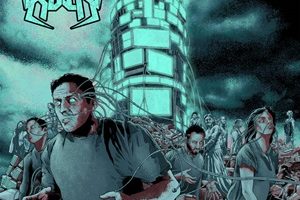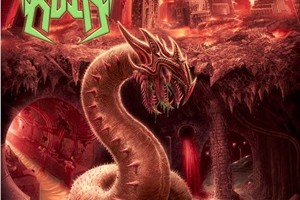Toxic Ruin – Obliteration of Nightmares
Tuesday, 31st August 2021
Hailing from Wisconsin, Toxic Ruin have been establishing themselves with a potent fusion of thrash/death since the early 2010’s. Releasing a previous album and EP, they signed with M-Theory Audio and have their latest album Nightmare Eclipse slashing and burning with sinister riffs, vicious vocals, solid, aggressive tempos and loads of interesting twists and turns to cause headbangers to scream and shout in approval. We reached out to all four members on Skype to bring us up to speed on the history, songwriting, views on heavy metal, insight into DIY touring, favorite metal albums and concerts, plus future plans. Here is my talk with bassist/vocalist Stephen Behrendt, guitarist Blake Toltzmann, lead guitarist Jacob Baneck, and drummer David Miller.
Dead Rhetoric: Your latest album Nightmare Eclipse is the band’s second full-length, and first with record label M-Theory Audio. How did you end up signing with this label, and where do you see the major differences in terms of songwriting, performances, and/or production values for this effort compared to Subterranean Terror from 2016 and the Mortal Insolence EP released in 2018?
Stephen Behrendt: To answer the first part, we were initially intending to release this album as a self-released thing. We had reached out to a few labels – a lot of labels actually – last summer around this time of the year. M-Theory had slipped under our radar. We released our first single “Ritual Rebirth” in December 2020, and a couple days later one of Marco’s (Barbieri – head of M-Theory Audio) friends told him to check this out, he may dig it. They got ahold of us, everything seemed right and after talking with us we wanted to work with him. It was an out of nowhere, out of the blue type of thing. Since then it’s been great working with them.
The songwriting and performances for this album, we are just better as musicians. We put in the time and practice a lot. Natural progression for that part. Subterranean came out in 2016, so that’s already five years old. The EP has been out for almost three years now. It’s us working hard and getting better at our instruments. The songwriting has gotten better. Production-wise we went to the same studio as we did for the EP. They just are able to find different tricks and stuff like that, they kill it on everything they touch. We push ourselves to be the best musicians that we can be.
David Miller: We just are continually writing things that are slightly beyond our capabilities of playing. Making that challenge for us is kind of important, I think.
Dead Rhetoric: Were there any particular songs on this new album that were more of a challenge than others, either in terms of the songwriting or recording?
Behrendt: I wouldn’t say particularly once we get into the studio. We try to be on top of our game when it comes time for that. Definitely when we start writing stuff and demoing it out, it’s very hard to play the tracks at the speed that we want to play them at. This is our riff, and we need to get good at it now. That is the process, and it shapes around that. We keep doing it until we get it right in the demo process, and then go into the studio.
Miller: If I had to pick one song, it would have to be “Until Everything Is Gone”, the opening track on the CD. It’s the fastest song that we’ve ever written, and especially from a drummer’s perspective it was a little bit difficult keeping up with that one.
Dead Rhetoric: What made you think of adding “Lord of Pandemonium”, a track off your first album, as a bonus cut for this one?
Miller: It was one that we kept playing live, a lot of Subterranean Terror material is starting to fade out in our live set. It seems like a lot of the fans dig this song, we decided to redo it with Stephen covering the vocals. And it’s actually… slightly faster on the new record than it was originally recorded. We still have some old stuff in the catalog that we can use in the live set.
Dead Rhetoric: Stepping up to be the main vocalist beyond your bass duties Stephen since the 2018 EP, how would you assess your development on that front – and was there a bit of apprehension or intimidation into stepping into that role and hopefully being convincing enough to achieve the results you wanted for Toxic Ruin?
Behrendt: Oh yeah, it sucked! (laughs) How it happened, I was doing the backup vocals and I was the only one who knew all the words at the time. I’ll give it a shot when we lost our vocalist and do it from there. After two shows, this is what we’ve got if we want to stick to this route as a four-piece, just work on getting better at it. I don’t know how some of the stuff came together. It’s a lot easier for me now, for Nightmare I wrote all of the lyrics for that album. I can write now with my other instrument in mind. If I was writing bass, I make sure to know if I’m doing vocals here, I can dial it back a bit and do what I need to do for both. Learning all the Subterranean stuff vocally was a bit more challenging, Chubzy had a few different patterns that I wasn’t used to doing. I was super nervous to do it. It was weird never knowing what to say in between songs, that took a few months to figure it out. Since then, we’ve had great feedback from the fans on this. We are just going to keep rolling with it, it works for us now.
Dead Rhetoric: Blake and Jacob, when it comes to your guitar work and styles, how do you approach things for Toxic Ruin, where do you believe your strengths lie?
Jacob Baneck: As a lead guitarist, I just want to mention a lot of my style comes from bands like Revocation, The Black Dahlia Murder, my death metal/thrash metal influence. Another really big band I have been following for a long time is Children of Bodom. They got me into metal, I’ve been enjoying the leads and solos of the great guitar players of those bands out there.
Blake Toltzmann: I don’t know man, I just like heavy shit! (laughs). I like writing heavy riffs.
Dead Rhetoric: The band blend together influences along the thrash and death spectrums, also incorporating a bit of melody and groove when called for. Would you say at this point there are specific hallmarks/trademarks in terms of the lyrical content or musical ideas/output that have to be there for Toxic Ruin – or are you willing to experiment, refine, and try new things as inspiration strikes you?
Miller: I don’t think we are stuck to just one path. We stick tightly to the world of death and thrash metal, but we like to throw in little bursts of different things here and there. Even back to the Mortal Insolence EP, in “Insolent Obsession” part of the bridge of that song, there’s almost a little funk section. It just makes the music a little more interesting if you can tie in different genres and things into it and retain the metalness.
Behrendt: Even though we all have the same goal for this, we all have different musical interests out of metal. Whenever we are writing material and have a scratch track down for demos, we are all throwing ideas in there for what we like personally, or what we’ve been thinking would be cool to add into it. Sometimes it works, sometimes it doesn’t – but that helps bring a little bit of variety to it. It gives it a uniqueness instead of a cookie-cutter thing. We aren’t like this is us, this is what we have to write every time. If it’s a good song, it’s a good song.
Dead Rhetoric: What can you tell us regarding the cover art for Nightmare Eclipse – and can you discuss your thoughts on the importance on striking cover work within the scope of heavy metal? Were there ever specific artists that captured your imagination purely based on the covers to conjure that right outlook before even pressing play with the music?
Toltzmann: From when I joined the band, we went through Mark Richards of Heavy Hand Illustration. He did the EP and will be doing the next album we are releasing, as well as a few t-shirt designs. He does a lot of art for a lot of other bands, we dig his style so we went with him. As for the second part. Good cover art is a good thing to have when it comes to metal. A lot of bands that I listen to, I’ve noticed that their cover art is pretty interesting before I even dive into their music.
Baneck: Just seeing really cool cover artwork, going through other artists, it gets your attention right away. Having solid art is definitely important in drawing attention.
Dead Rhetoric: You’ve done some DIY tours over the years beyond your local area to establish more of a presence in the scene – including a tour last year cut short due to the COVID-19 pandemic with Lich King and the Stonecutters. What have been some of your favorite memories, and how would you describe the band’s performance philosophy live, what do you want audiences to get out of seeing you in that live setting that may differ from the studio output?
Behrendt: That entire run with the Stonecutters and Lich King was fantastic. It was great for everybody, except getting shut down early. My favorite memory is us playing in Turtle Creek, Pennsylvania. We played a little show in the valley with a bunch of mountains. Mike from Lich King had discovered that we were probably inside a ninja turtle because the only thing to eat within fifteen miles was crappy pizza. We thought we were in a turtle the whole time, that was our theme for the rest of the tour. That was awesome, and the live stream we decided to do the day of. We did that at Lich King’s studio, Sonic Titan studios. It was a bunch of fun to do that, partying and hanging out for that one night, let’s end this tour with a bang.
As for live, we try to bring as much energy as we can, whether we are playing for five people or ten thousand. We bring the same energy no matter what. We love what we are doing, and we want our fans to feel our passion for it. Hopefully it keeps them interested and moving around with us.
Miller: I think it was Randy Blythe who said at one point in time whether we are opening a show or headlining we are going to play it like we are decimating the crowd. We like to see it that way too – we are going to put all the energy we have into it, make everyone else step up their game a little bit.
Dead Rhetoric: Being a part of a vibrant and decently established underground metal scene in Wisconsin – can you discuss the influence of acts like Morbid Saint, Jungle Rot, or even the legendary Milwaukee Metalfest series of annual shows and how that has made an impact on your vision, outlook, and goals for Toxic Ruin?
Behrendt: It’s a little hard. A personal thing for me is Morbid Saint practices twenty feet away from our space. When we first moved in here, guitarist Jay (Visser) got us a spot, it was hard to get a spot in this building. I looked up to him when I was starting to play this music, when I met him it was a surreal thing for me to meet one of my childhood idols. Now I see him, I’ve known him forever. Kind of the same thing with Jungle Rot too. Geoff (Bub) has come to a bunch of our shows, he loves us. Seeing what they’ve done and where they’ve gone with their music helps us think about getting to that point. We are adults, we all pay our bills, now let’s take our fun job and see if we can get to the next level to get where they are at. It helps pushes us, we have some big shoes to fill in this area. We are trying to keep up with everybody else.
Dead Rhetoric: How do you assess the state of heavy metal in 2021? What areas are you happiest about, and what needs to be improved in the short-term (or long-term) for the greater good of the genre as a whole?
Miller: As a whole in the metal genre, in this generation we need to see a little bit more originality come into it. It seems like to me anyway, over the last five to ten years now there’s been a lot of cookie cutter bands coming up. They are doing well, a lot of them are making names for themselves and even getting radio play, which is good. I think to differentiate yourselves you need to have a little bit of originality, and to different subgenres like deathcore, all of the above, you can almost throw a dart at the board and anywhere you hit, three of them would sound almost identical. I think more often than not, bands are coming out trying to copy others where we are trying not to do that.
Behrendt: Another thing too, is younger bands getting a little too full of themselves. Sometimes where it’s their first show, and they expect to get paid a lot of money. We don’t really make a lot of money and we’ve been doing this for almost ten years now as a group. They are expecting to be Metallica status right away, and they need to understand there are stepping stones to get to that point. You have to work very hard at it, and make sure you are practicing with your band. I feel like a lot of younger bands, they will play a couple of shows and it’s not what they expected it to be. They expect it to be this rock star lifestyle, and we are backstage at a show, taking a nap. We are not partying, we are relaxing. Especially younger bands, people who haven’t been playing shows, it’s weird to see that come up and see them expect way more than what’s going to happen with it. It’s a reminder that you have to work for it and not every show is going to be outstanding. We still have shows where five people show up. One of those shows we hope to do our best, hope to make one or two new fans out of it, and maybe next time they will bring more friends if they like it.
Dead Rhetoric: What do you see as the biggest challenges or obstacles that the band needs to overcome at this point in your career – especially if you want to move up the ranks in terms of a bigger following?
Behrendt: Work! (laughs) Time management. Our work schedules as we all work full-time jobs. That’s really all it comes down to, for me anyway.
Miller: Balancing things out. Especially after this year, with the label support we are getting a lot busier. Our personal lives can get busy too, just balancing it out together while trying to write new music and push the album release at the same time. That’s life. Something starts out as a fun hobby, you want to get good at it. Things just pile on top along with it.
Dead Rhetoric: How did you guys as a band handle this extended downtime from shows and music activity with the COVID-19 pandemic? What long term impact do you believe this pandemic will have towards humanity?
Behrendt: We spent a lot of time jamming. We played it pretty safe, nothing out of the ordinary. We have a lot of riffs in our riff bank that need to get looked at, to see if they are still good. We probably have forty or fifty riffs piled into the computer here. That’s pretty much all we did. I don’t know how to answer the last question.
Miller: I would hope things go back to the way they used to be, time will tell.
Dead Rhetoric: What do you consider three of the most important metal albums that shaped your outlook or had a dramatic impact on your viewpoints for the genre- and what have been some of your favorite concert memories you’ve taken in, purely as an audience member?
Behrendt: Number one – Operation: Mindcrime by Queensrÿche. That is hands down my favorite album of all time. Toxik – Think This. And Powerslave by Iron Maiden. Those are the three most influential albums for me. I hear something new every time I listen to them, and I’ve probably listened to them at least a thousand times each. My favorite concert experience, the last time I saw Iron Maiden my buddy and I got first to the barrier passes. That was the best show I’ve ever been to.
Toltzmann: That’s a hard one. For sure, Rust in Peace- Megadeth. My dad always listened to that when I was a kid, so I got a big dose of that as a child. Municipal Waste – The Art of Partying. That was when I started listening to more thrash metal. And you could pretty much throw any Arsis album in there. I like everything they do. That’s where my musical taste is going these days. Favorite concert experience. Probably Full Terror Assault festival, two years ago. Vio-lence played, that was pretty cool to see them as I listened to them a lot in high school. Did a lot of stagediving and partying.
Miller: Number one, Master of Puppets – Metallica. My dad was a huge metalhead, ever since I came out of the womb I’ve been indoctrinated right into Metallica fandom. I have memories of mowing the grass while having my Walkman on, burning through that tape. Second – I was never much of a nu-metal guy, but Subliminal Verses by Slipknot, when I was really young that steered me in the direction of more heavier music. Until that point it had been bands like Metallica and Anthrax, other things I heard on the radio. Probably number three, I would have to go with Deathless by Revocation. That came out in 2014, and there is not a single bad moment on that record. You can see I focus a lot of my writing style around a lot of the songs on that CD. It’s made an influential impact. Favorite concert experience was when I was 15-16 years old, I saw Job for a Cowboy, Gwar, and Lamb of God. It was the most violent concert I’ve ever seen, in a crowd of 5,000 people. Everybody was packed together, covered in Gwar blood, it was the greatest thing.
Baneck: As far as top album, for people who know me, that would be Are You Dead Yet? by Children of Bodom. It was a time when I started listening to Children of Bodom a lot, and metal in general. It paved the way to influence me to pick up the guitar. Of course Alexi Laiho has these ridiculous leads and fast lead playing. Second album, Dave and I share the same one Deathless by Revocation. Not a single bad song on that album, Dave Davidson at that point I started appreciating his writing and what the band was doing. I’ve learned a lot of the groovy/blues playing from David and the death/thrash genre. I would go third with Sylosis – Conclusion of an Age. That brings me back to my favorite show experience – seeing Sylosis play with Lamb of God, they opened that show. Sylosis blew my mind, shredding and taking over the stage.
Dead Rhetoric: How do you see the next year or two shaping up for Toxic Ruin in terms of promotion, touring, shows, etc. now that the album will be hitting the streets?
Behrendt: We have some plans that are in the works for early next year. Can’t say much more on that. We will do the ‘big news’ coming soon thing. Hopefully everything still pans out good and we can hit the road early next year. We want to play as much as we can, as many places as we can. Give this album a good cycle for the first year and see where it goes from there.

























